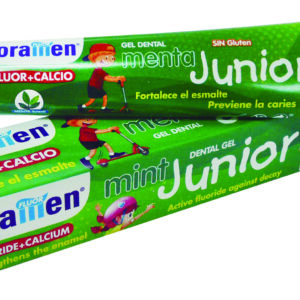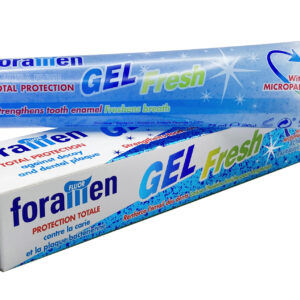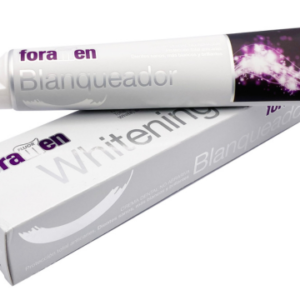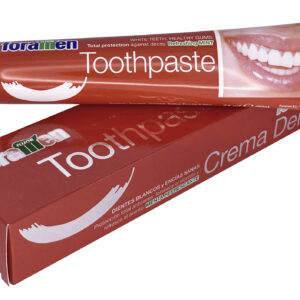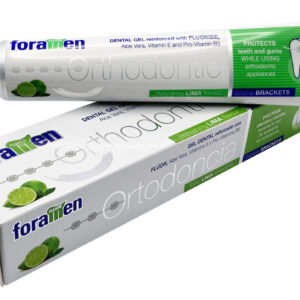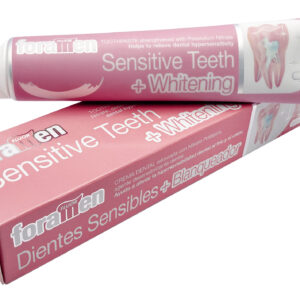
The efficacy of toothpaste in tooth care

One of the first measures in the care of teeth is the use of toothpaste. At Foramen we are very aware of this and that is why we offer several toothpastes so that all our customers can choose the one they like the most.
Without it, cavities would be even more numerous and our mouths would not be as clean, and with age our teeth would fall out due to gum problems.
What is toothpaste and how does it work?
Although we always mention teeth when talking about toothpaste, the truth is that it is also responsible for the health of the gums.
When the toothpaste is applied properly and with the toothbrush, dental plaque is removed. This is a sticky film composed of bacteria that adheres to the teeth. If not cleaned, it leads to tooth decay and gum disease.
Over the years, it has evolved and specialized with new formulas and specific ingredients. Thus, it also prevents bad breath, gingivitis or tooth sensitivity.
The aesthetic role of toothpastes should not be forgotten, as many have whitening agents that eliminate or reduce stains, helping to make the smile whiter and brighter.
Why are toothpastes effective?
The efficacy of toothpastes is due to the components they contain, which may change according to the brand or the problem they are intended to prevent.
Thus, one of the main ingredients are abrasives, which are the ones that remove food residues, stains and plaque from the tooth when scrubbing with the brush. This abrasive can be bicarbonate, hydrated silica or calcium carbonate.
They go in such an amount that they do not damage the enamel no matter how much we rub, but they do help by polishing the tooth.
They also include fluorides for caries prevention. They strengthen teeth when integrated with tooth enamel, making them resistant to the acids produced by plaque bacteria that cause tooth decay.
Of course, they come with antimicrobial agents such as zinc chloride, although this only tends to be found in formulas that fight the bacteria that cause gingivitis and bleeding gums.
Through the wetting agents, the paste does not dry out. This makes it easier to use and has a texture that makes it easy to handle.
What else can toothpaste bring?
Although the flavoring does not affect its effectiveness, mint, eucalyptus or cinnamon enhance its taste and contribute to a fresh breath sensation that is very pleasant.
Desensitizers such as potassium nitrate or potassium citrate are also commonly added. Both substances block the channels leading to the sensitive nerves of the teeth, reducing that unpleasant sensation when drinking something very cold or very hot.
How can we maximize its effectiveness?
At Foramen we work to make toothpaste as effective as possible, but at the user level there are a series of guidelines to be followed that contribute to making its action stronger.
Selecting the right toothpaste
If we want the toothpaste to be really efficient, it is best to select the right one for us depending on our needs.
For example, if we experience tooth sensitivity, it is best to opt for one that fixes this problem, while if we want to have very white teeth, we can opt for one with whitener.
Brushing your teeth on a regular basis
There is little point in choosing the best toothpaste on the market if we do not brush our teeth regularly. Brushing should always be done after meals and before going to bed.
By doing so, we ensure that the toothpaste is effective and does its job, especially in terms of plaque removal.
What is the right amount of paste?
We often make a mistake with the amount of toothpaste we put on our toothbrush. We fill it and that is a failure, as it serves with a “pea”, since putting more does not make it more effective.
In addition, and in the case of children, over-placing can be detrimental to them. Their mouth will fill with foam and they will eventually swallow some of it.
Brush should be changed regularly
For the paste to work, it has to make a good tandem with the brush. If this fails, the paste will not be as effective as it should be, especially in removing plaque and food debris.
It is recommended to change the toothbrush every three or four months, although given the prices they have our advice is to change it before, every two months at the most. This will prevent the bristles from wearing out and the toothpaste from losing its effectiveness.
Share

